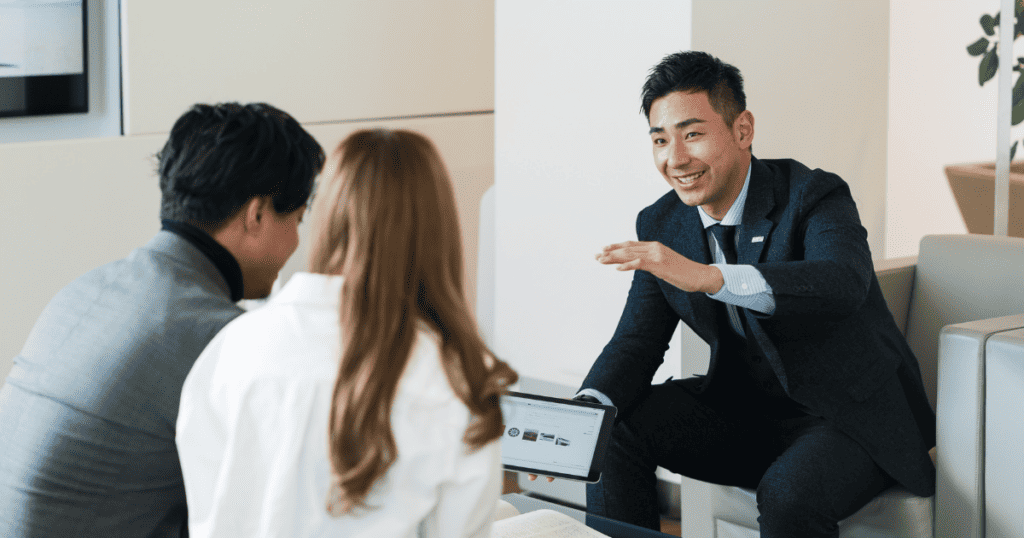A steady stream of leads is the backbone of any growing dealership. It’s not just about getting people through the door but about creating meaningful engagements that convert into sales. Effective lead management can make the difference between a thriving dealership and one that’s just getting by.
Continuing our in-depth series on how CRMs can benefit auto dealerships, we’re focusing today on the critical role of lead management. An optimized CRM system can empower your sales team in ways you might not have imagined. Let’s unpack the potential of using your CRM for mastering lead management so you can drive more sales.
What Is Lead Management?

Lead management is the process of capturing and nurturing leads until they become customers. It involves activities like:
- Capturing lead information from various sources like walk-ins, website visits, and phone calls
- Tracking activities and behaviors of leads to understand them better
- Qualifying leads based on their likelihood to purchase
- Following up in timely, personalized ways to engage them
- Closing the deal to convert the lead into a customer
A CRM system is valuable for simplifying and streamlining lead management activities. However, it’s not just about collecting data. The goal is to use the data to take informed actions that convert leads into customers. The following section will discuss specific ways you can do just that.
10 Ways to Use Your Dealership CRM for Lead Management
Now that we’ve defined lead management, let’s explore how your CRM can help you transform leads into loyal customers.
1. Organize Lead Information
The cornerstone of effective lead management is organization. A CRM system allows your sales team to store crucial information about your leads, including contact details, where the lead came from (phone, email, walk-in, online form, etc.), preferred car models, past interactions with your dealership, and more.
A centralized database ensures that team members can pick up where others left off. As a result, the customer enjoys consistent communication and a seamless experience.
2. Real-Time Tracking of Leads
Your CRM’s real-time tracking keeps every sales team member updated on a lead’s status. This information is immediately visible to your team as interactions with potential customers occur—whether they schedule a test drive, call the dealership with questions, or do something else that moves them to a purchase.
With real-time information at their fingertips, your sales team can make informed decisions and respond immediately to lead behavior or status changes. This allows them to capitalize on opportunities and provide a personalized, responsive customer experience.
3. Tasks and Notifications

CRM systems can be set up to send immediate notifications to your sales team as soon as a new lead comes in. These platforms also enable you to set tasks and reminders for follow-up calls, scheduled test drives, and more.
Automated notifications ensure that opportunities for engagement are never missed. Whether it’s a callback or an appointment, your team will always know their next move for each lead, thereby optimizing your chances for a sale.
4. Prioritizing Leads
Lead scoring is a feature of most CRM systems that lets your sales team objectively assess each lead’s potential value. By assigning scores based on criteria (such as previous interactions, buying signals, or engagement with your dealership’s content), you can determine how “hot” a lead is and how urgently they need to be contacted.
Armed with this information, your sales team can allocate their time and resources, focusing on leads more likely to convert into sales. This enables them to operate more effectively, boosting sales potential and ensuring that high-quality leads are given the attention they deserve.
5. Segmentation
Lead segmentation is another powerful feature of CRM systems. It allows your sales team to categorize leads and divide them into specific groups based on factors such as geographic location, budget, or the vehicle models they’re interested in.
By leveraging segmentation, your sales team can execute highly focused outreach efforts. For instance, if your dealership just received the newest SUV of a particular auto brand, your sales team can easily pull up a list of previous customers or leads who have shown interest in that make and model. Targeted outreach like this is much more likely to resonate with the prospect and will increase the efficiency and effectiveness of your sales team.
6. Automated Follow-Ups

The follow-up process can often be overwhelming, especially when dealing with a large volume of leads. A CRM system enables your sales team to send out automated messages to contacts, whether a follow-up email after a phone call, a text reminder for an upcoming test drive, or something else.
Automation reduces the chances of human error and ensures that your leads are consistently engaged. Meanwhile, your sales team is freed up to focus on more complex tasks.
7. Personalized Service
Personalization is an essential factor for today’s car buyers. A CRM system lets your sales team know who they are talking to, what that person is interested in, and what interactions they’ve previously had with your dealership. This information helps build a relationship that feels less like a transaction and more like a personalized experience.
Consider integrating your CRM with your cloud phone system for an extra layer of personalization. When a lead or customer calls, their information appears on your screen. This allows your team to greet them by name, quickly access their history, and make recommendations based on past interactions. CRM integration is an easy and effective way to make each call more personal and productive.
8. Inventory Management Linked to Leads
An advanced CRM can keep real-time tabs on your inventory, letting your sales team know exactly what cars are available, their features, and their pricing. This enables quicker, more accurate communication with leads interested in specific models or features.
With your inventory data integrated into your CRM, your sales team is better equipped to guide leads through the decision-making process. This helps prevent missed opportunities, as representatives can offer real-time suggestions based on what’s in stock.
9. Automate Post-Sales Follow-Up

Your CRM can shine after the sale, too. Automated systems can send emails and text messages to keep the relationship with your customers active, all while reducing the manual workload for your sales team. Some of the ways you can use your CRM for post-sales follow-up include:
- A thank-you email to make the customer feel valued and reinforce their purchase decision
- A survey to get insights into the customer’s buying experience and help you refine your sales process
- A request for an online review to boost your dealership’s reputation and attract new customers
- A request for referrals (especially to those who gave high survey scores or posted great reviews) to capitalize on customer satisfaction and bring in new leads
- A coupon for a first oil change or other service reminders to encourage repeat visits and cultivate customer loyalty
10. Analytics Related to Leads and Sales
Finally, a robust CRM system will provide analytics beyond just sales numbers. You can get insights into the time it takes for a lead to convert (to understand how efficient your sales process is), the most common touchpoints (to find out what interactions are the most influential in the customer’s journey), and much more.
These analytics can help you fine-tune your sales strategy. They provide actionable data that can be used to improve processes, create better employee training programs, and set sales goals.
Mastering Lead Management with a CRM

A CRM is more than just a place to store customer data; it’s a tool that empowers your sales team to convert leads into loyal customers. Your dealership’s growth depends largely on how well you manage your leads, so try these tips to improve lead management with your CRM.
Stay tuned for more expert insights as we continue this series on dealership CRM systems. Our next article will explore how CRM systems can be used in your customer service department. See you then!



